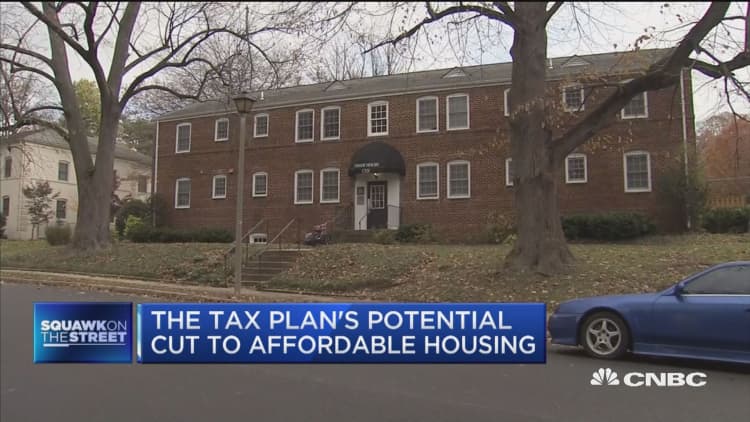
America needs more affordable housing. That is a fact. How to fund that housing, however, has Republican tax writers in the House at odds with those in the Senate.
It all comes down to a type of tax-exempt bond that funds about half of all affordable housing development. The House tax reform bill eliminates the bond — the Senate bill retains it.
Tax-exempt private activity bonds (PABs) are issued by state or local governments and loaned to private companies to finance qualified projects. The bonds are most commonly used for the construction of affordable multifamily housing, but also for hospitals and infrastructure projects, like roads and bridges.
While most major U.S. cities have seen a boom in construction of luxury apartments and condominiums, the nation is in the midst of an affordable housing crisis. As home prices and rents rise, more people are in need of this housing, but it is harder to get developers to invest in it. That is because it is a lot more lucrative to build fancy buildings that can command high rent than to build lower-cost rental buildings in less wealthy neighborhoods. The tax credits have been something of a bridge to entice developers to build lower-cost housing.
"Low-income housing needs some sort of government assistance. It is simply uneconomic to do this without a subsidy," said Rick Goldstein, a tax attorney with the law firm Nixon Peabody and counsel to the Affordable Housing Tax Credit Coalition, a Washington housing lobby.
"It's a devastating reduction if you cut that type of financing from the few programs that really exist out there to help people, to help the government help our communities build affordable rental housing," Goldstein said.
But that is just what the House Tax Cuts and Jobs Act bill does. Republican lawmakers made it clear in their bill:
"The Federal government should not subsidize the borrowing costs of private businesses, allowing them to pay lower interest rates while competitors with similar creditworthiness but that are unable to avail themselves of PABs must pay a higher interest rate on the debt they issue."
The elimination of these bonds is bigger than just its face value. The bonds are a pathway for developers to gain access to the low income housing tax credit. Lawmakers kept that intact but effectively hollowed its efficacy because about half of those credits are granted in conjunction with the private activity bonds.
For developers not using the bonds, their costs would go up as well under the tax plan, due to the proposed cut in the corporate tax rate to 20 percent from 35 percent. This would effectively cut the tax loss benefits of investments made using the low income housing tax credits because the value of depreciation expense deductions would fall.
If the bonds go away and the corporate tax rate falls, that could reduce the future supply of affordable rental housing by close to 1 million units over the next 10 years, according to an analysis by Novogradac & Co., an accounting firm.
PAB issuance hit $20.38 billion in 2016, according to an annual survey by the Council of Development Finance Agencies. The previous peak was $14.5 billion in 2010. Multifamily housing bonds represented about 70 percent of the PABs issued.
Housing advocacy groups in Texas and Florida are urging House Speaker Paul Ryan to reconsider cutting the bonds, claiming they are necessary to fund repair and rebuilding efforts in hurricane-ravaged neighborhoods.
"While we know you have been strongly supportive of disaster recovery efforts, eliminating PABs would be a step backward," the groups wrote in a letter to the Wisconsin Republican. "If the House passes a bill that eliminates PABs, you will be putting vital resources at risk at a time when they are needed to repair and rebuild homes of those affected by hurricanes Harvey and Irma."
While PABs are cut in the House bill, they are not touched in the Senate tax plan, and lawmakers on both sides of the aisle are now embroiled in a bond battle.
"We will be reaching out to House leadership urging them to keep the tax-exempt status of private activity bonds, which are used to fund important public goods such as health-care facilities, affordable housing, and education," Rep. Randy Hultgren, R-Ill., and Dutch Ruppersberger, D-Md., said in a joint statement this week.
Eliminating the program would save the government $38.9 billion over 10 years, according to an estimate by Congress' Joint Committee on Taxation. The entire package would create a more than $1 trillion deficit.


